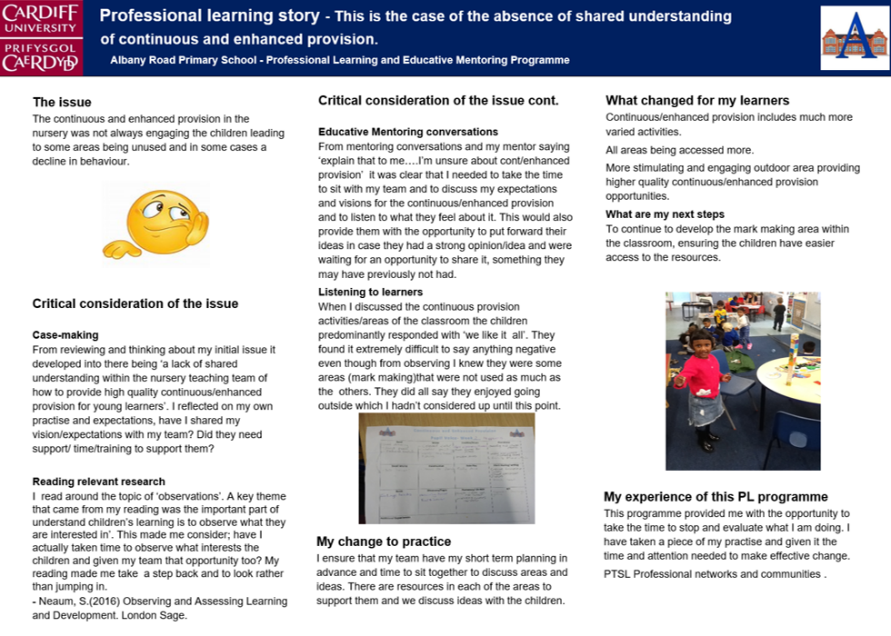 Albany Primary School
Albany Primary School
Bespoke to and driven by practitioners
Built on a critical view of research, professional enquiry and external expertise
Information about the school
Albany Primary is a vibrant inner-city Primary School located on a busy shopping street. There are 440 pupils from Nursery-Year 6. Approximately 70% of pupils speak English as an additional language and there are currently 45 different languages spoken in the school community.
Approach taken
The professional learning work undertaken by Albany Primary school incorporates two of the hallmarks – Bespoke to and driven by practitioners & Built on a critical view of research, professional enquiry and external expertise. Due to the Professional Teaching Standards, Albany Primary School identified the need to use research and enquiry to inform their Professional Learning. It was important to the school that mentoring played a key role and that the professional learning was closely linked to individual teacher’s needs.
This Professional Learning work commenced in 2018. The Headteacher had engaged in an International Erasmus project which included visits to Finland and Italy. A key reflection of this was the consideration of what really matters in school. Evidence from these visits highlighted the need to develop trust in staff, provide quality professional learning opportunities and support for staff as opposed to directing everything. A lot of Professional learning had become led by others informing teachers what they should do rather than trusting their professionalism and understanding – This led to the question is this really right?
In addition to this the Professional Teaching Standards included an element on ‘wider reading and research findings’ and this was an area that the Headteacher and Deputy Headteacher felt needed support to develop effectively. Albany Primary realised that whilst they may have capacity to have professional dialogue, could this be more structured or focussed and could it be developed into a mentoring conversation and improve quality of professional dialogue across the school.
With the greater focus on research in Professional Teaching Standards they had to consider:
- How easy was this to do as a full-time class teacher?
- Where can teachers easily access appropriate literature & journals?
As a school they approached Cardiff University to explore the possibility of working with a Higher Education Institution to support and develop these ideas.
They dedicated a significant amount of time throughout the year to this work – 2 days and 3 half days. This was very important to the success of the professional learning work. Staff participated in group discussions. Drilling down to specific, individual issues and challenges to explore. Staff chose an issue pertinent to them – this was a key part of the success as the individual teacher really wanted to explore and develop an idea. This developed staff confidence as mentors – listening, questioning, and discussing. The was avoiding quick fixes and but not finding solutions for people.
Individual staff embarked on a journey of professional learning and individual cases were shared with project leaders. Appropriate articles and journals were shared to develop thinking and share differing viewpoints on the case being explored. Regular mentoring discussions in groups were developed for research and reading and also professional enquiry. The schools professional learning work on this model with mentoring conversations and questions to explore further and deepen understanding.
The professional learning work took place for the full academic year and staff presented their journey poster which outlined their individual case to colleagues in an INSET session. This was a powerful session and enabled staff to fully reflect on their professional learning work.

“We’ve learnt that not everything works but there is no failure. Whilst the initial challenge may not have been overcome, staff understanding, and experiences still have a positive impact by ‘learning from the process’”.
Albany Primary’s whole approach to school improvement and professional learning has changed. Dialogue, reflection, questioning is used to explore ideas further. Appropriate literature is used to explore viewpoints that may support or challenge thinking. Staff are all fully involved and valued, and conversations are open and honest. This has meant that the professional learning work has greater depth and creates changes to practice that will last and impact upon future cohorts. Previously professional learning may have been quick fixes and only on the surface. Future plans include inking the Professional Learning Process to Curriculum for Wales development and Professional Development.

